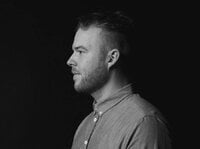Phantom lamp by Normann Copenhagen is designed by Simon Legald, and the shape of it is reminiscent of a traditional chandelier. The dramatic silhouette of the Phantom lamp is achieved by spraying the steel frame with a flame-retardant resin, like a silkworm forms its cocoon. Light filters through the semi-transparent material softly, creating an atmospheric lighting to your bedroom or living room.
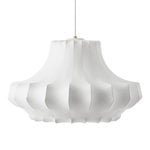
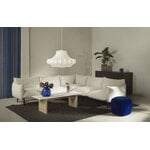
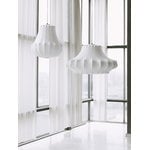
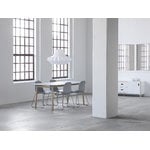
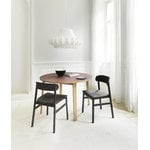
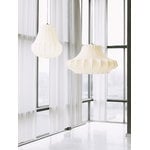
Phantom pendant, M, white
Normann Copenhagen
Description
Phantom lamp by Normann Copenhagen is designed by Simon Legald, and the shape of it is reminiscent of a traditional chandelier. The dramatic silhouette of the Phantom lamp is achieved by spraying the steel frame with a flame-retardant resin, like a silkworm forms its cocoon. Light filters through the semi-transparent material softly, creating an atmospheric lighting to your bedroom or living room.
Product details (21)
- Material
- Environmental flame-retardant resin, steel frame
- Colour
- White
- Width
- 80 cm
- Diameter
- 80 cm
- Height
- 44 cm
- Bulb base
- E27
- Light source
- 13W LED (not included)
- IP rating
- 20
- Protection class
- II
- Voltage
- 220–240 V
- Nominal frequency
- 50–60 Hz
- Certifications and labels
- CE marked: tested and approved according to European standards
- Cable length
- 400 cm
- Cable colour
- White
- Cable material
- Textile
- Weight
- 2 kg
- Canopy
- Included
- Ceiling plug
- No
- Care instructions
- Phantom can be cleaned with a duster
- Dimmable
- No, but can be fitted with and aligned dimmer.
- Notes
- Bulb size must not be larger than L:11 cm x Ø:6cm
- Product ID
Designer
Simon Legald (b. 1986) is a Danish designer and Head of Design at Normann Copenhagen. Graduating from the Royal Danish Academy of Fine Arts in 2012, Legald began his long and productive collaboration with Normann Copenhagen shortly after. His designs blend traditional craftsmanship with industrial techniques, focusing on modern simplicity and a precise balance between functionality and visual aesthetics. One of Legald's best-known works is the Form chair collection, which received the iF Design Award in 2016.
View all productsReviews (0)
Sustainability
The Product Sustainability Framework, our criteria of sustainable design, helps you find the most sustainable products in our selection. Read below which sustainability criteria this product has met.
Working conditions & labour 7/9
-
Equal opportunities for all employees
-
Commitment to UN Global Compact, fair compensation for all employees
-
Corporate responsibility requirements defined and communicated for suppliers
-
Systematic work for improved inclusion and well-being in the workplace
-
Transparent supply chain
-
Suppliers' compliance to a code of conduct ensured
-
Compliance to the UN Guiding Principles on Business and Human Rights ensured in the supply chain
-
Direct suppliers audited and certified
-
Support for community involvement in the supply chain
Eco-friendly production 6/9
-
Fair and resource-wise water-use in production
-
No incineration or landfilling of returned items
-
No use of endangered species as materials
-
No direct environmental emissions or waste (excl. GHGs) from production
-
Material-efficient and ecological packaging
-
No potentially harmful chemicals used in own production
-
The sustainability of direct suppliers' production is addressed and monitored
-
Production and material sourcing that respect biodiversity, animal rights, and natural ecosystems
-
Positive impact on nature’s well-being through operations that regenerate natural ecosystems
Climate impact 4/8
-
Company's direct greenhouse gas emissions identified and commitment to reduction
-
Product's carbon impact identified and commitment to reduction
-
Guidance on energy- and eco-efficient use of the product
-
Contribution to climate initiatives beyond the brand’s direct operations
-
Low-carbon or compensated transportation
-
Carbon footprint of the product calculated and goals set to reduce it
-
100 % renewable energy in own production and operations
-
Carbon neutral or carbon negative product
Sustainable materials 3/6
-
Sustainable and long-lasting material choices
-
No harmful or hazardous substances
-
Responsible raw material sourcing and production
-
Materials suited for circularity: monomaterials, recyclable finishings, renewable or recycled contents etc.
-
Ecological materials: natural, biodegradable, recyclable or recycled contents
-
Outstanding materials in terms of innovativeness, responsibility, sustainability and circularity: local production or sourcing, 100 % recycled content, C2C-certification etc.
Circular design 3/5
-
High aesthetic quality promoting long-term use of the product
-
Technically durable product design and material choices
-
Design for enduring life-long quality
-
Design and support for product maintenance, repair and upgradability
-
Innovative circular design solutions: circular service system, resale platform, remanufacturing, collection of used products, etc.






